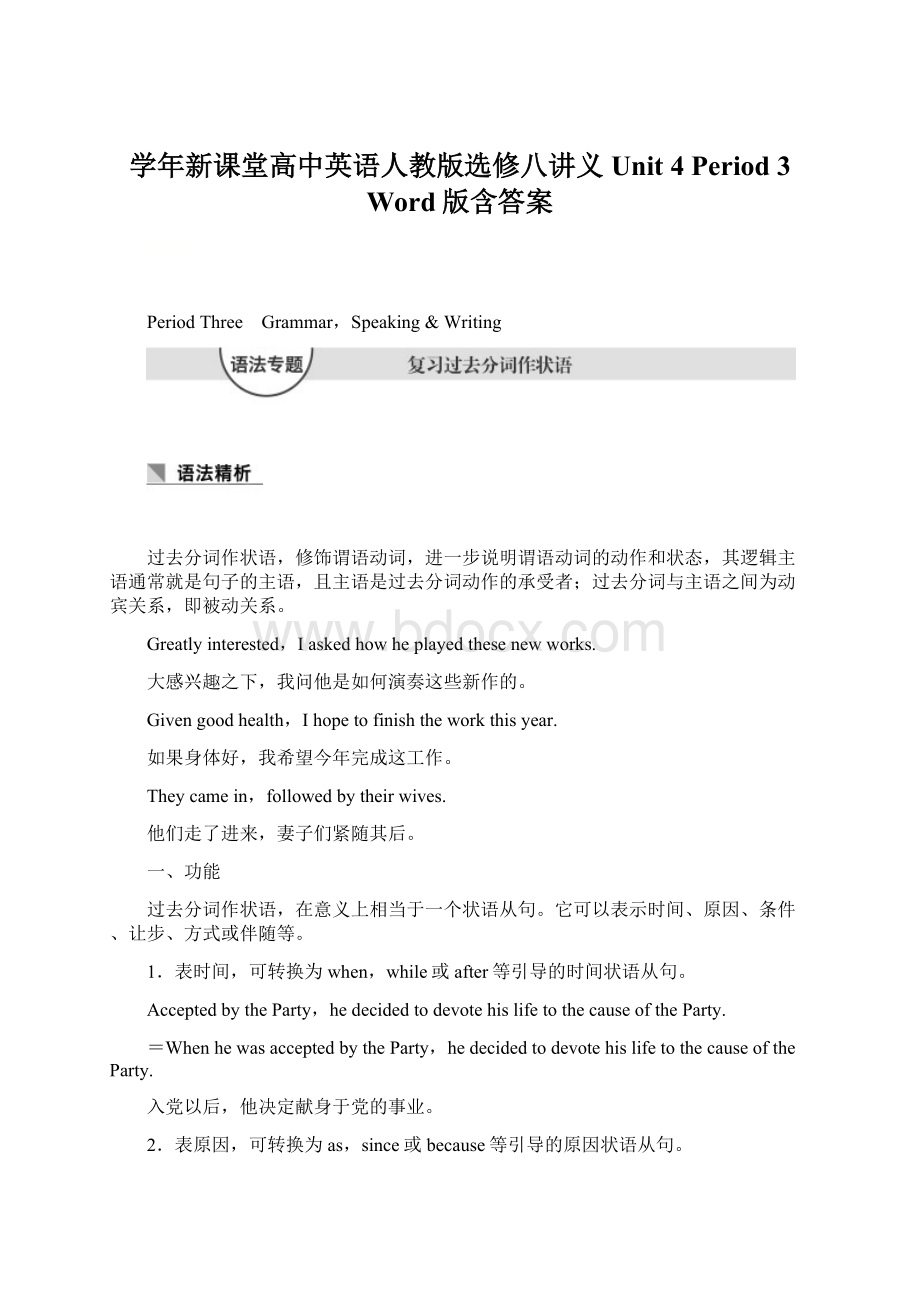 学年新课堂高中英语人教版选修八讲义Unit 4 Period 3 Word版含答案.docx
学年新课堂高中英语人教版选修八讲义Unit 4 Period 3 Word版含答案.docx
- 文档编号:3975067
- 上传时间:2022-11-26
- 格式:DOCX
- 页数:17
- 大小:68.10KB
学年新课堂高中英语人教版选修八讲义Unit 4 Period 3 Word版含答案.docx
《学年新课堂高中英语人教版选修八讲义Unit 4 Period 3 Word版含答案.docx》由会员分享,可在线阅读,更多相关《学年新课堂高中英语人教版选修八讲义Unit 4 Period 3 Word版含答案.docx(17页珍藏版)》请在冰豆网上搜索。

学年新课堂高中英语人教版选修八讲义Unit4Period3Word版含答案
PeriodThree Grammar,Speaking&Writing
过去分词作状语,修饰谓语动词,进一步说明谓语动词的动作和状态,其逻辑主语通常就是句子的主语,且主语是过去分词动作的承受者;过去分词与主语之间为动宾关系,即被动关系。
Greatlyinterested,Iaskedhowheplayedthesenewworks.
大感兴趣之下,我问他是如何演奏这些新作的。
Givengoodhealth,Ihopetofinishtheworkthisyear.
如果身体好,我希望今年完成这工作。
Theycamein,followedbytheirwives.
他们走了进来,妻子们紧随其后。
一、功能
过去分词作状语,在意义上相当于一个状语从句。
它可以表示时间、原因、条件、让步、方式或伴随等。
1.表时间,可转换为when,while或after等引导的时间状语从句。
AcceptedbytheParty,hedecidedtodevotehislifetothecauseoftheParty.
=WhenhewasacceptedbytheParty,hedecidedtodevotehislifetothecauseoftheParty.
入党以后,他决定献身于党的事业。
2.表原因,可转换为as,since或because等引导的原因状语从句。
Deeplymovedbythestory,theexcitedpeoplestoppedquarrellingwitheachother.
=Becausetheyweredeeplymovedbythestory,theexcitedpeoplestoppedquarrellingwitheachother.
激动的人们被那个故事深深地感动了,停止了争吵。
3.表条件,可转换为if,once或unless等引导的条件状语从句。
Ifheated,watercanbeturnedintovapour.
=Ifitisheated,watercanbeturnedintovapour.
水如果被加热,会变成水蒸气。
4.表让步,可转换为although,though或evenif等引导的让步状语从句。
Exhaustedbytherunning,theywentonrunningaftertherobber.
=Althoughtheywereexhaustedbytherunning,theywentonrunningaftertherobber.
尽管已经跑得筋疲力尽,他们还是继续追赶着那个盗贼。
5.表方式或伴随情况。
作方式状语,如有连词asif,就转换为asif引导的方式状语从句;若无连词,则转换为并列结构。
作伴随状语,一般转换为并列结构。
Theoldmanwentintotheroom,supportedbyhiswife.
=Theoldmanwassupportedbyhiswifeandwentintotheroom.
那个老人在妻子的搀扶下走进了房间。
二、连词+过去分词
分词作时间、条件或让步状语时,为了明确其意义有时可在分词前加上when,while,if,once,unless,although等连词。
相当于状语从句的省略。
Ifmerelydrawnonyourimagination,thereportwillnotbeconvincing.
假若仅靠你的想象去写,报告是不会有说服力的。
注意:
有些过去分词来源于系表结构,作状语时不表被动而表主动。
这样的过去分词及短语常见的有:
lost(迷路);seated(坐);hidden(躲);stationed(驻扎);lost/absorbedin(沉溺于);born(出身于);dressedin(穿着);tiredof(厌烦)等。
Lost/Absorbedindeepthought,hedidn'thearthesound.
因为沉溺于思考之中,所以他没听到那个声音。
即时跟踪1
Ⅰ.用过去分词作状语改写下列状语从句
1.Whenitisseenfromthetopofthehill,thecitylookedlikeabiggarden.
Seenfromthetopofthehill,thecitylookedlikeabiggarden.
2.Becausetheywereencouragedbythespeech,theyoungpeoplemadeuptheirmindstotakeupthestruggle.
Encouragedbythespeech,theyoungpeoplemadeuptheirmindstotakeupthestruggle.
3.Ifweareunited,wewillstand;ifwearedivided,wewillfall.
United,wewillstand;divided,wewillfall.
4.Eventhoughhewaslaughedatbymanypeople,hecontinuedhisstudy.
Laughedatbymanypeople,hecontinuedhisstudy.
5.AuntHucamein,and(she)wasfollowedbyherhusband.
AuntHucamein,followedbyherhusband.
Ⅱ.单句改错
1.Followedbyhistwobrothers,andWangLinenteredtheroom.
2.Thoughbeingtoldtostop,theexcitedspeakerkeptontalkingatthemeeting.
3.Heleftwithoutsayingaword,beingtiredofthespeech.
三、过去分词的独立主格结构
1.分词作状语时,要特别注意其逻辑主语必须和句子的主语一致。
否则,分词必须有自己的主语。
这种带主语的分词被称为分词的独立结构或叫独立主格结构,在句中作状语,表示时间、原因、条件等。
Givenanotherhour,Icanalsoworkoutthisproblem.
再给我一个小时,我也能解这道题。
(given为过去分词作状语,它的逻辑主语为主句主语I)
Allthingsconsidered,herpaperisofgreatvalue.
把所有的情况考虑在内的话,她的论文很有价值。
(considered为过去分词作状语,它有自己的主语allthings,而主句主语为herpaper)
Thesignalgiven,thebusstarted.
信号一发出,汽车就开动了。
(thesignal是given的逻辑主语,因此主句主语thebus就不是given的逻辑主语)
Herheadheldhigh,shewentby.
她把头昂得高高地从这儿走了过去。
(herhead是heldhigh的逻辑主语,因此主句主语she就不再是heldhigh的逻辑主语)
2.独立主格结构有时也可以用“with/without+名词(或代词的宾格)+分词”结构,表示伴随状况。
其中with/without可省略。
Theysattheresilently,(with)theireyesfixedonthelake.
他们静静地坐在那里,眼睛看着湖面。
即时跟踪2
用独立主格结构完成下列句子
1.问题解决了,他们既高兴又轻松。
(With)Theproblemsettled,theywerehappyandrelaxed.
2.由于眼镜摔坏了,她看不见黑板上的字。
Herglassesbroken,shecouldn'tseethewordsontheblackboard.
Ⅰ.用所给动词的正确形式填空
1.Ordered(order)overaweekago,thebooksareexpectedtoarriveanytimenow.(2016·北京)
2.Raised(raise)inthepoorestareaofGlasgow,hehadalong,hardroadtobecomingafootballstar.(2015·重庆)
3.Absorbed(absorb)inpainting,Johndidn'tnoticeeveningapproaching.(2015·天津)
4.Muchtimespent(spend)sittingatadesk,officeworkersaregenerallytroubledbyhealthproblems.(2015·江苏)
5.Thelecturehavingbeengiven(give),alivelyquestion-and-answersessionfollowed.(2014·江苏)
6.Children,whenaccompanied(accompany)bytheirparents,areallowedtoenterthestadium.(2014·湖南)
7.Clearlyandthoughtfullywritten(write),thebookinspiresconfidenceinstudentswhowishtoseektheirownanswers.(2014·天津)
8.Ifasked(ask)tolookafterluggageforsomeoneelse,informthepoliceatonce.(2013·江西)
9.Founded(found)intheearly20thcentury,theschoolkeepsoninspiringchildren'sloveofart.(2013·安徽)
Ⅱ.单句改错(仅有1处错误)
hungry,webuiltafirebythelakeandbarbecuedthefish.(2013·陕西)
Conjecture&Emotions&
Judgementandevaluation
表示推测、猜测、情感和判断与评价的一些句型有:
Conjecture(推测,猜测):
1.Iwonderwhether...我想知道是否……
2.Isitpossiblethat...?
……可能吗?
3.Whydoyouthinkso?
你为什么这么认为?
4.Doyouknowif...?
你知道是否……?
5.Doyouthinkthat...?
你认为……?
6.Perhaps/Maybe,but...也许/可能,但是……
Emotions(情感):
1.Howdoyoufeelabout...?
你感觉……怎么样?
2.Whatdoyouthinkwouldmake...?
你认为什么使得……?
3.Heisdisappointedat...他对……失望。
4.Theyareworried...他们担忧……
5.Theyareamazed...他们吃惊……
Judgementandevaluation(判断与评价):
1.Perhapsyoucoulddomore...也许你能够做得更……
2.Iknowyoutalkedabout...but...我知道你们讨论了……但是……
3.Your...hasimproved,butyoustillneedto...
你的……已经提高了,但是,你仍然需要……
4.Ithinkyouneedmorepracticeat...
我认为你在……方面需要更多的练习。
5.Ithinkyoulookperfect,but...
我认为你看起来很完美,但是……
6.Youruseof...ismuchbetter,but...
你的关于……的使用很好,但是……
[即时跟踪]
语法填空
Wife:
It'sFridaytoday.Howdoyouwanttospendtheevening,darling?
Husband:
Well,why1.notgodancing?
Wehaven'tdonethatforalongtime.
Wife:
Oh,2.totell(tell)thetruth,Idon'treallyfeellikegoingdancingtonight.IhadaharddayandI'msortoftired.What'smore,I3.amsupposed(suppose)togorockclimbingwithmycolleagueDorothytomorrowmorning.
Husband:
Well,inthatcase,wecouldgotothenewmovieLifeofPi,4.bythatworld-famousdirectorAngLee.Ireallylikehiswork,5.whichwillstopshowingthedayaftertomorrow.
Wife:
Oh,wegotothemoviestoomuch.Can'twedosomethingdifferentforachange,honey?
Husband:
Well,doyouhaveany6.suggestions(suggest)?
Wife:
Letmesee.7.Howdoyoufeelaboutaskingsomefriendsovertoplaycards?
Husband:
It'sOKwithme,8.butwedon'thaveanybeeroranythingtoeatathome.
Wife:
Well,9.itisbettertocallJulietandaskherandthatneighborof10.hers(her),David,tocomeover,andI'llgotothestoreandbuysomefoodanddrinks.
Husband:
OK.That'sagoodidea.
【文体指导】
1.明确写英语故事的基本要素
英语故事属于记叙文,进行此类写作时,一般需要把握好记叙文的六个要素,即when(时间),where(地点),what(事件),who(人物),why(原因),how(方式)。
尽管不是每篇英语记叙文都一定要将这些要素全部包括进去,但是,确定写作内容、收集写作素材必定要围绕这些要素进行。
2.确定写作的人称和故事展开的顺序
写故事时要注意人称,用第一人称主要是以“参与者”的身份介绍本人的经历或耳闻目睹之事;用第三人称则主要是以“观察者”的身份介绍他人的经历和事情。
不过在用第一人称时,不要过多地使用I,we,以免给人单调乏味的感觉;在以第三人称进行叙述时,要避免过多的评论,以致失去故事的客观性。
在确定了叙述的角度后,还要确定以何种顺序展开记叙。
讲述故事时最常见的方式是以时间为线索交代故事的发生、发展和结局。
这样,文章层次清晰,脉络分明,有较强的整体感。
3.正确把握时态,提高语言的准确性
英语故事往往介绍过去发生的事,所以通常使用过去时态。
故事结束后描写从中吸取的教训或故事发展的后续则常用一般现在时态或将来时态。
4.选择使用情感性词汇,提升文章的感染力
英语故事写作中可使用一些情感性词汇来提升文章的感染力,此类词汇有:
even,still,only,hardly,almost,indeed,certainly,toone'sjoy/surprise/disappointment,fortunately等。
常用句式
1.开头用语:
oneday,onaSundaymorning,longlongago,manyyearsago,onceuponatime...
2.记叙过程用语:
Therewas/were/lived...
Thereusedtobe...
WhenIsaw/heard...I...immediately.
Onseeing/hearingthat,I...rightaway.
Suddenly,hestoodup,staredatme,andgotclosetome.
Iwasdoing...when...
Iwasaboutto...when...
3.过渡语:
(1)now/atpresent/nowadays,recently/lately,onOct.13,atweekends,lastmonth,theotherday,thedaybeforeyesterday,etc.
(2)atfirst/atthebeginning,next/then/afterthat/afterawhile,suddenly/allofasudden,byandby/gradually,finally/atlast/eventually/intheend,etc.
4.故事结束语:
Thestorytellsusthat...
Fromthisstory,wecanlearnthat...
【写作任务】
请根据寓言故事《拔苗助长》写一篇英语小故事。
故事梗概:
从前,有个农夫,种了稻苗后,便希望能早早收成。
每天他到稻田查看时,都发觉那些稻苗长得非常慢。
他等得很不耐烦。
想了又想,他终于想到一个“最佳方法”,他将稻苗全都拔高了几分。
第二天一早,他就迫不及待地去稻田看他的“成果”,结果却看到所有的稻苗都枯萎了。
注意:
1.可适当增加细节,以使行文连贯;
2.词数100左右。
参考词汇:
稻苗seedlings;拔高pullup
审题谋篇
第一步 明确要求
本题要求根据提示写一篇寓言故事,为记叙文,用第三人称,以一般过去时为主要时态。
因本题文字提示较多,需要我们根据故事的发展确定取舍,并注意详略得当。
同时,注意不要拘泥于所给的汉语句子结构和模式,要“灵活”表达,尤其是注意处理某些难点,如“稻苗枯萎了”、“把稻苗拔高了几分”。
另外,在描写农夫时最好用上带有感情色彩的词语。
第二步 确定段落
可分两段进行写作:
第一段:
种了稻苗后去看稻苗生长及想出拔高稻苗的做法
第二段:
稻苗被拔高后的后果
第三步 词汇热身
1.破土而出breakthroughthesoil
2.开始对……没有耐心getimpatientwith
3.迫不及待地做某事can'twaittodosth
第四步 句式升级
1.种了稻苗后,每天他到稻田时,都发觉那些稻苗长得非常慢。
(一般表达)Afterheplantedtheseedlings,hewenttothericefieldeverydayandfoundtheyoungriceplantsgrowslowly.
(高级表达)Afterheplantedtheseedlings,hewenttothericefieldeveryday,findingtheyoungriceplantsgrowslowly.(非谓语动词作状语)
2.想了又想,他终于想到了一个“最佳方法”,他可以将稻苗都拔高几分。
(一般表达)Hethoughtandthought,andfoundagreatwayatlast.Hecouldpulluptheyoungplantsbyhalfaninch.
(高级表达1)Hethoughthard,andatlastagreatideastruckhim—hecouldpulluptheyoungplantsbyhalfaninch.(strike)
(高级表达2)Hethoughtandthought,andatlasthehituponagreatidea/itoccurredtohimthathecouldpulluptheyoungplantsbyhalfaninch.(hitupon或occur)
3.第二天早晨,他迫不及待地去稻田看他的“成果”。
(一般表达)Thesecondmorning,hewenttothericefieldhurriedlytoseehis“result”.
(高级表达)Thenextmorning,hecouldn'twaittogotothericefieldtocheckhis“achievement”.
连句成篇
ToPullUptheSeedlingstoHelpThemGrow
Onceuponatime,therewasanoldfarmerwhoplantedalotofrice.Afterheplantedtheseedlings,hewenttothefieldtowatchtheseedlingsgroweveryday.Hesawtheyoungshootsbreakthroughthesoilandgrowtallereachday,butstill,hethoughttheyweregrowingtooslowly.Eventuallyhegotimpatientwiththeyoungplantsandsuddenlyhehituponagreatideatopulluptheyoungplantsbyhalfagreatinch.
Thenextearlymorning,the
- 配套讲稿:
如PPT文件的首页显示word图标,表示该PPT已包含配套word讲稿。双击word图标可打开word文档。
- 特殊限制:
部分文档作品中含有的国旗、国徽等图片,仅作为作品整体效果示例展示,禁止商用。设计者仅对作品中独创性部分享有著作权。
- 关 键 词:
- 学年新课堂高中英语人教版选修八讲义Unit Period Word版含答案 学年 课堂 高中英语 人教版 选修 讲义 Unit Word 答案
 冰豆网所有资源均是用户自行上传分享,仅供网友学习交流,未经上传用户书面授权,请勿作他用。
冰豆网所有资源均是用户自行上传分享,仅供网友学习交流,未经上传用户书面授权,请勿作他用。


 广东省普通高中学业水平考试数学科考试大纲Word文档下载推荐.docx
广东省普通高中学业水平考试数学科考试大纲Word文档下载推荐.docx
